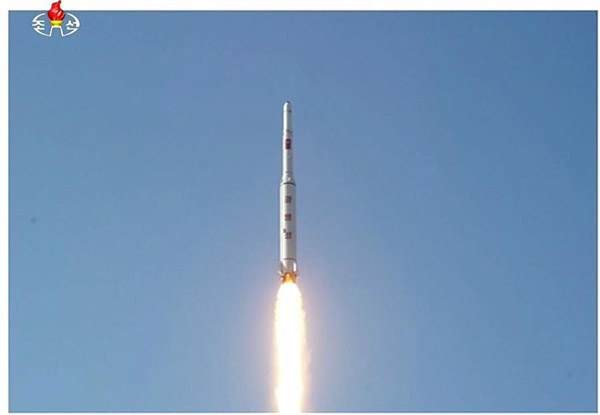Peninsula crisis will not hurt China-ROK ties
Updated: 2016-03-29 07:42
By Woo Jin-hoon(China Daily)
|
|||||||||
 |
|
The Democratic People's Republic of Korea launches a long range rocket launched into the air in this file still image taken from KRT video footage, released by Yonhap on February 7, 2016. [Photo/Agencies] |
Despite the recent nuclear test and rocket launch by the Democratic People's Republic of Korea, tough UN economic sanctions on Pyongyang and the planned deployment of the US' Terminal High Altitude Area Defense missile defense system in the Republic of Korea, economic and people-to-people exchanges between China and the ROK are still flourishing.
The temporary economic hardships China faces as a result of its economic restructuring will not dent the confidence of ROK enterprises in the future of the world's second-largest economy. And the unaffected government and non-government exchanges testify that bilateral ties between Beijing and Seoul will not be shaken by negative external factors. There is no possibility the strained situation on the Korean Peninsula will drive a wedge between them as some Western and ROK media have speculated.
A telephone conversation between President Xi Jinping and his ROK counterpart Park Geun-hye after Pyongyang's nuclear test once again proved the deep friendship between the two countries. The active communication between the two countries based on their mutual trust and non-evasive attitude toward sensitive issues, such as the simultaneous transmission of a warning message to Pyongyang, showcases their hopes and efforts to resolve the issues through dialogue. For the sake of smooth ties and also regional peace and development, China and the ROK should try to avoid unnecessary misunderstandings before the deployment of the THAAD missile system is formally confirmed, and should maintain close communication and dialogue to enhance mutual trust.
China is concerned that US-led Western countries will excessively exaggerate its influence on the DPRK and put the main responsibility for the failed international endeavor to stop Pyongyang's nuclear tests on China and then advance military drills to exacerbate already-strained regional situations. Such a scenario will negatively affect China's national security interests.
For its own security and interests, China was involved in the Korean War. China's involvement was out of its inseparable geographic and traditional links with the peninsula, but its participation in that war also brought China heavy sufferings. Instability on the peninsula is always viewed by China as a potential threat to its security. The US has military bases in a number of China's Asian neighbors, such as the ROK, Japan, the Philippines, Thailand and Pakistan. But it is China's belief that the US and Japan are using Pyongyang's nuclear test as an excuse to deploy the THAAD system on ROK territory, and that any US military intervention on the Korean Peninsula under the pretext of the peninsula's instability will pose a direct threat to its national security.
The Six-Party Talks are the only international mechanism for resolving the nuclear issue on the Korean Peninsula. Of the six parties, China and the ROK should have more motivation to push for the issue's peaceful settlement given that any crisis on the peninsula would pose a bigger threat to them than the other parties, such as the US, Russia and Japan.
The two Koreas are technically still at war because the armistice signed following the end of the Korean War (1950-53) has not been replaced by a peace agreement. Once the DPRK possesses nuclear weapons, it is China and the ROK that are on the DPRK's doorstep, not the US, and it is they that will be under the most direct security threat. Hence, China and ROK should make more joint efforts to push for the denuclearization of the Korean Peninsula.
China and the ROK both need a stable surrounding environment for their development. If the nuclear issue on the peninsula is utilized by external factors to cause regional insecurity and instability, it will result in the largest losses to China and the ROK instead of others.
China and the ROK should cherish their hard-won friendship and try to persuade the DPRK to abandon its nuclear weapons program and initiate reform and opening-up, which is the only way to develop its economy and safeguard itself.
The author is a guest professor at the School of Finance, Renmin University of China.
Related Stories
ROK says DPRK can conduct 5th nuke test at any time 2016-03-21 14:32
'Monday Afternoon Fever' in the ROK 2016-03-19 10:32
ROK's top envoy for six-party talks to visit China for talks about DPRK issues 2016-03-17 16:06
DPRK denies cyber attacks against ROK officials 2016-03-14 08:08
Today's Top News
Inspectors to cover all of military
Britons embrace 'Super Thursday' elections
Campaign spreads Chinese cooking in the UK
Trump to aim all guns at Hillary Clinton
Labour set to take London after bitter campaign
Labour candidate favourite for London mayor
Fossil footprints bring dinosaurs to life
Buffett optimistic on China's economic transition
Hot Topics
Lunar probe , China growth forecasts, Emission rules get tougher, China seen through 'colored lens', International board,
Editor's Picks

|

|

|

|

|

|







